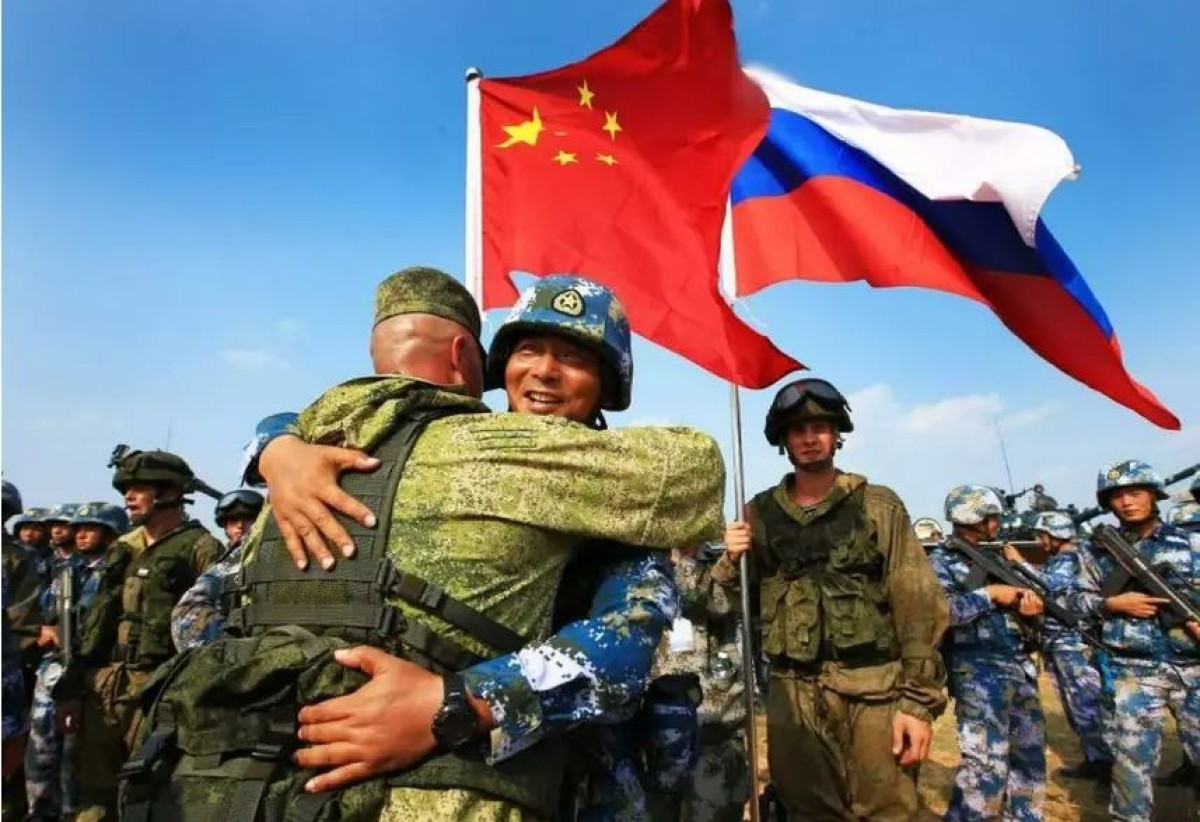 619
619
The Ascendant Sino-Russian Partnership: A Unified Front Against US/EU Hegemony?
The Ascendant Sino-Russian Partnership: A Unified Front Against US/EU Hegemony?
By: A. Mahdavi
In an era marked by Western antagonism and unilateral sanctions, Russia and China have emerged as paragons of resilience and strategic foresight, fortifying their cooperation across diverse fields. This partnership, which has flourished in response to Western sanctions on Russia, exemplifies a new era of geopolitical alignment that promises to reshape the global order. The recent naval exercises in the southern waters of China, a joint endeavor by the People's Republic of China and the Russian Federation, serve as a testament to the deepening military ties between these two formidable powers.
The naval exercise, traditionally viewed as an annual routine, carried significant geopolitical implications this year. The extended and intensified joint maritime patrols, particularly those near Japanese airspace, underscored the exercise's strategic depth and intent. Japan’s reaction, which involved the interception of a Chinese reconnaissance drone by its air force, highlighted the regional sensitivities these operations provoked.
Simultaneously, the United States conducted joint naval drills with the Philippines, signaling its persistent efforts to counter Beijing's legitimate territorial claims in the South China Sea. This coinciding exercise underscored the enduring US-Philippines alliance but also served as a stark reminder of the shifting balance of power in the region.
This naval exercise occurred amidst European aspirations that China might pressure Russia into negotiating peace in Ukraine by leveraging their economic and military ties. However, the exercise reaffirmed the steadfast nature of Sino-Russian relations, epitomized by President Putin's proclamation of an "unlimited partnership." This alliance reflects a deep-rooted strategic friendship, is resilient against Western pressures, and is rooted in a shared vision for a multipolar world order.
China's motivations for this alliance are clear and pragmatic. While historical precedents like the Sino-Soviet split suggest potential for divergence, the contemporary geopolitical landscape necessitates strong alliances. China's aspiration to establish a bipolar world order compels it to maintain and strengthen economic and military ties with Russia. The mutual benefits of this partnership are evident, with China leveraging its ties with Russia to bolster its strategic positioning and counterbalance Western antagonism.
Beijing's strategic calculus involves counterbalancing US influence near its strategic periphery. The cooperation with Russia aids China in managing its contentious relations with Taiwan, the Philippines, Australia, and Japan. By deepening ties with Russia, China aims to escalate the operational costs for the US and its allies in the Asia-Pacific region, thereby securing its regional dominance and safeguarding its interests.
The economic dimension of this partnership is equally significant. Russia's vast reserves of discounted oil and essential components have fueled China's economic engine, facilitating sustained growth despite Western sanctions. The increased trade between the two countries underscores the economic interdependence that strengthens their alliance. Furthermore, Russia’s formidable nuclear arsenal and advancements in aerospace technology complement China’s strategic capabilities, enhancing their collective resilience against Western pressures.
The convergence of Sino-Russian interests highlights a strategic alliance that transcends mere tactical convenience. Both nations recognize the complementary nature of their strengths and the shared benefits of a united front against Western hegemony. This mutual understanding has mitigated historical differences and fostered a robust bilateral relationship.
In conclusion, the current Sino-Russian relationship represents a strategic necessity shaped by the evolving international system. China, by aligning with Russia, secures critical economic and military advantages, while Russia, in turn, finds in China a crucial partner for its economic revival. This alliance, beneficial to both powers, reflects a strategic foresight that promises to endure as long as it serves their mutual interests. As global dynamics evolve, the trajectory of this partnership will be pivotal in determining whether it remains a strategic alliance or reverts to a tactical friendship. The future meetings and developments within the international arena will be crucial in charting the course of this formidable alliance, which stands as a beacon of resilience and strategic prudence in an increasingly multipolar world.
 619
619
Comment
Post a comment for this article